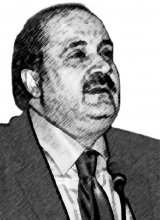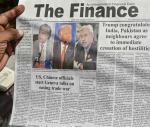You are here
Socio-cultural politics, the Middle East and the academy
Mar 15,2018 - Last updated at Mar 15,2018
Men of letters in the field of socio-cultural politics dealing with the American legacy in the academy of the Middle East, are in a dire need today, more than any other time, to respond to two crucial issues for intellectuals in that field of knowledge worldwide.
First, how did the American “neoliberal” dogma use such conceptual issues and terms as multiculturalism, globalisation, religious freedom and freedom of speech, as examples, to rationalise “American exceptionalism,” often in support of the American economic, political, military and cultural expansion around the four corners of the globe?
Neoliberalism, for that matter, is a term that suggests nothing more than a political smear. It remains without any analytic power, though, in a way, it called out a “neoliberal agenda” for pushing deregulation on economies around the world, for forcing open national markets to trade and capital, and for demanding that governments shrink themselves through frugality or privatisation.
The term goes back to the 1930s, and, ever since, it has been revived as a way of describing global current politics, or more specifically, the range of ideas that are allowed by politics and the politicians worldwide. In the aftermath of the 2008 financial crisis, it was a way of assigning responsibility for the debacle, not to a certain political vision per se, but to an establishment that had conceded its authority to the market. But that is another and different story.
Second, if the American neoliberalism has rightly engaged cultural media, what are the worthiest means of criticising its central purpose or purposes for that matter? Would it be possible, under the prevailing regional and international political, economic and socio-cultural circumstances, to envision a “counter culture” that might effectually defy neoliberalism, or is such a hypothesis already structured by such labels as “radicalism”, “extremism”, and, even worse, “terrorism”, which in the common imagination refer to political and social groups, predestined to marginalisation?
“Cultural criticism,” in my view as an Arab Americanist, employed by scholars like Edward Said can be adapted to accommodate the new circumstances raised by the American neoliberalism and its control of the media. Therefore, we need to reconsider the role of the Americanist as a little more than an “interdisciplinary scholar”, but as a socio-political critic who should be capable of negotiating controlling the media and how its experts decide how we see the rest of the world.
According to the Institute of International Education, for instance, the number of Middle Eastern students pursuing higher studies in the US has recently declined by 8.4 per cent. While the political ambience has unfavourable effect on the students’ decision, declining oil prices is another economic factor that plays a chief role in the reduction of higher education budgets in the Arab oil-producing countries. In addition, increased competition in the higher education sector among European countries and the anti-Muslim partiality under US President Donald Trump will oblige students' decline further.
In short, higher education institutions in both parts of the world do need to amend their plans, taking into account those new socio-economic, educational and political challenges.













